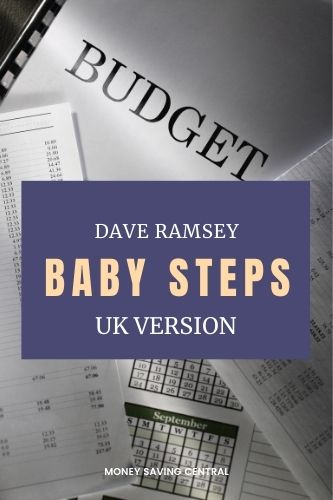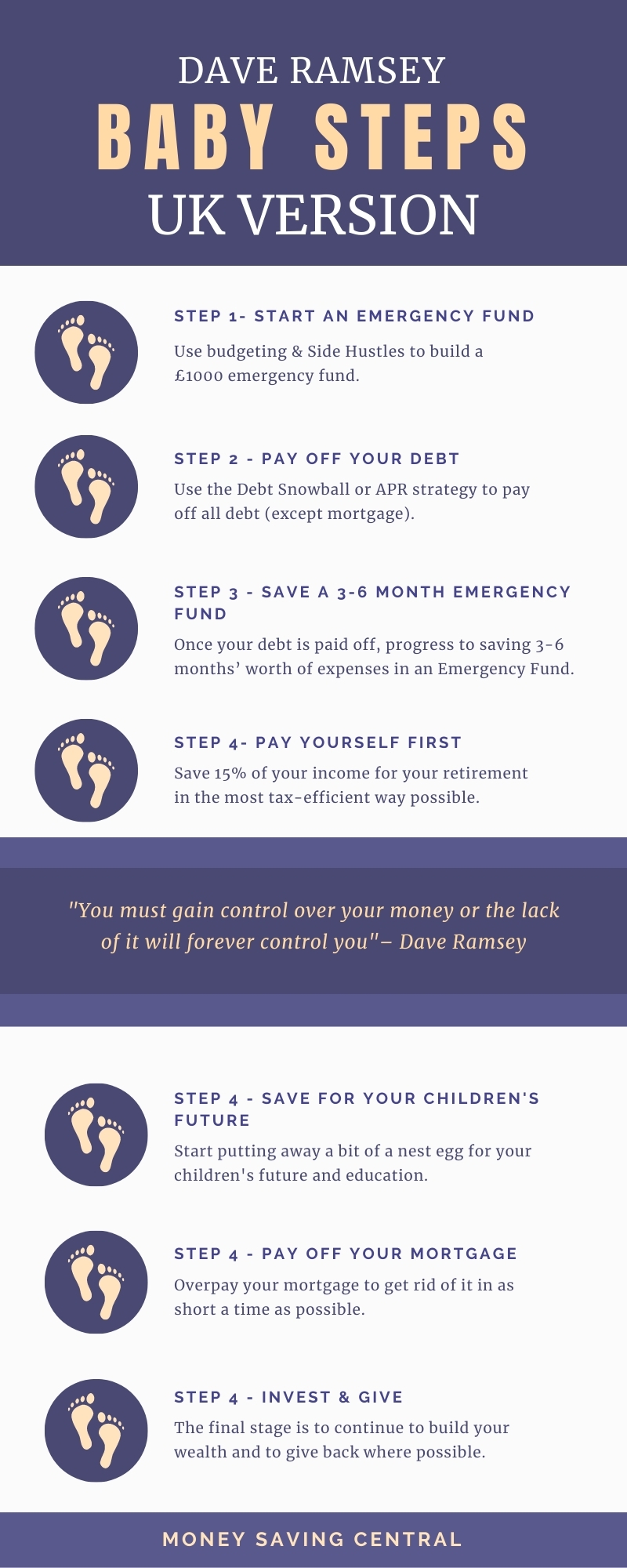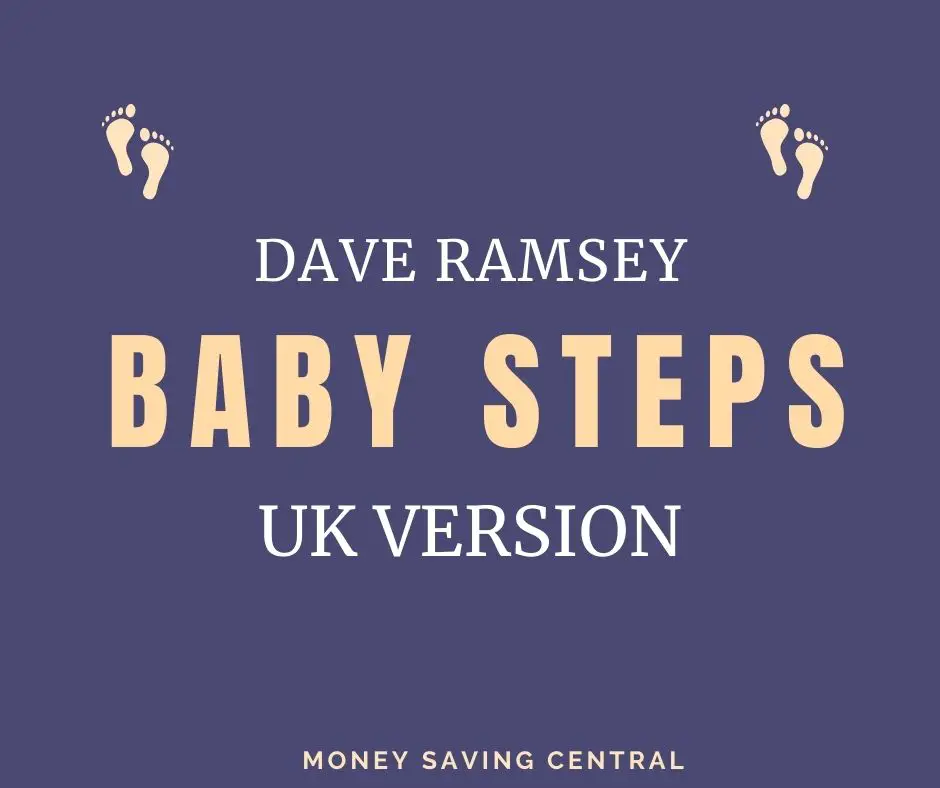Use Dave Ramsey Baby Steps to pay off debt with the UK adapted version of the popular Debt solution. This step-by-step guide will help transform your finances in 2025.

Dave Ramsey's philosophy is that those in debt, who stick to the program will learn how to save for emergencies, build savings, become mortgage free, get out of debt and ultimately go on to build wealth.
Dave Ramsey Baby Steps UK

7 Simple Steps to take control of your Finances
How do I take control of my money and become debt-free? Dave Ramsey has the answer in just 7 Baby Steps. The only problem being - it is entirely focused on America. But that should not stop anyone from the UK from following the steps.
Let’s take a look at how we can make it relevant to those of us in the UK wanting to take our finances in hand.
What are Dave Ramsey's 7 Baby Steps?
In short, Dave Ramsey’s 7 baby steps to taking control of your financial future are as follows:
1 - Save £1000 for your Starter Emergency Fund
2 - Pay off all debt (except the house) using the debt snowball
3 - Save 3-6 months of expenses in a fully-funded emergency fund
4 - Invest 15% of your household income in retirement
5 - Save for your children’s college fund
6 - Pay off your home early
7 - Build wealth and give
Some of that may sound scary and completely out of reach, but when you break it down and take them one step at a time, you start to notice the changes pretty quickly, so let’s get into it...
BABY STEP 1 – Start an Emergency Fund
Starting is often the most difficult thing but here Dave Ramsey is focusing on just getting a bit of a cushion in the bank to cover life’s emergencies. Ramsey says to aim for $1000, and, for those of us in the UK, changing this to £1000 keeps things simple and is a good number to aim for. This is often enough to cover any unforeseen major cost like car maintenance or house repairs, but not so out of reach that you will need to save for years on end to get there.
We can look at getting this £1000 cushion in the bank in two ways – budgeting your spending so you can save a bit every month or working on some side hustles to make some extra cash. Or a bit of both!
Budgeting
For many, this sounds like a bit of a chore but taking control of your finances with a budget can be, and is, life-changing. For an in-depth look at how to budget your life and save those extra few pounds have a look at these Budgeting Tips. There’s even a Free budget template for you to print off.
Making some extra cash
There are numerous ways of making a bit more money on the internet, and honestly, a quick search will bring up hundreds of suggestions for you. I’ve collated some of my favourite ways to make extra money online that a perfect for those looking to earn a few extra £££s
Check out these 50+ ways to Make Money Fast in 2025
BABY STEP 2 – Pay off your Debt
This is the key to really unlocking your financial control, and Dave Ramsey wants you to tackle your debts head-on and go after them hard!
He suggests using the debt snowball strategy, which focuses on talking one piece of debt at a time, from smallest to largest – Let’s break that down:
The Snowball Strategy
List all your debts from largest amount to smallest amount, regardless of APR. Make the minimum payments on all but the smallest debt, which you throw everything you possibly can at each month. As each piece of debt is cleared, the money used towards paying that off is added to the next.
Let me give you an example – You have £5000 in car debt, £2000 on a credit card, and £500 in debt for a sofa. You start off targeting the sofa paying off £100 per month, while you pay the minimum off on the car and the credit card, let’s say £50 each. Once the sofa is paid off you move to the next smallest debt and add the £100 you were paying for the sofa to that. This means you are now paying £150 on the credit card and still the minimum of £50 on the car. Again, once the credit card is paid off you take that £150 and add it to the car payment, so you are now paying £200 off per month on the car.
So as you start to tackle the larger debts you have larger amounts available each month to pay towards it. It’s a great strategy and one that really works well.
For those of you who want to minimise the amount you pay overall, however, there is another strategy you could consider…
The APR strategy
Similarly to Dave Ramsey’s snowball strategy, you will be focusing on paying off one piece of debt at a time and then moving that freed up cash to the next piece of debt, but instead of tackling them from lowest to highest, you will list them from highest APR to lowest APR.
What does this do? It massively reduces the amount you have to pay overall by attacking the highest interest-bearing ones first.
Let’s look at that previous example again - you have £5000 on a car with an APR of 8%, £2000 on the credit card with an APR of 5% and the £500 for the sofa is at 0% APR.
Instead of starting with the sofa, you would start with the car, and then move to the credit card, and then finally the sofa. Paying off the sofa may be quicker, but it’s not costing you any extra over the long term. The credit card and car, on the other hand, are accumulating interest every month meaning in the long run it will cost you more money to pay this debt off.
Either method works well, to be honest, and) the important thing here is that you want to pay off your debts as quickly as possible, and remember don’t add more debt at any time!
Once you complete Baby Step 2 this is when the fun starts. Now it’s time to build your wealth, not claw it back.
BABY STEP 3 – Save a 3-6 Month Emergency Fund
The next step is a simple one, build a bigger cushion for yourself. Dave Ramsey suggests saving 3-6 months’ worth of expenses in an Emergency Fund so that should anything happen, and you are unable to work for any reason, you won’t have the immediate stress of needing money now to pay your bills.
It is completely up to you how much of a cushion you want here. If you are young and single, then having 3 months worth of expenses saved may very well be enough. If you have a family to look after too you may want the extra comfort of 6 months expenses saved.
BABY STEP 4 – Pay yourself First
This is where those of us from the UK tend to get a little lost as Dave Ramsey starts talking about maxing out your 401k or Roth IRA’s. Let’s clear this jargon up quickly to better understand what the savvy UK saver should be doing in this instance.
Simply put, Ramsey is talking about saving 15% of your income for your retirement in the most tax-efficient way possible. In the UK this can (and should) be done in two ways: ISA and pensions.
For those of you wanting the direct correlation with the US system, a Roth IRA is an ISA and the 401k is your pension.
Let’s break these down a bit more to understand why they are important and worth investing in:
ISA
Individual Savings Account (ISA) is different from a normal savings account for one very great reason; the interest it earns is tax-free.
Your first port of call for any savings should be into an ISA. Each year every person in the UK has a certain amount they are allowed to invest in an ISA, and it should be your mission each year to get as close as you can to maxing it out. There are some great articles on which is the best ISA to use, but if you don’t want the hassle of looking too hard your bank will almost certainly have the option of setting up an ISA for you.
Pension
It is now mandatory for companies in the UK to offer a pension plan for all their employees, so this is something that you will most likely already be contributing to.
Simply put your pension is a tax-efficient way of saving for your retirement.
Your first step should be talking to your employer about how much you can volunteer to add to your pension pot, and what is the maximum they will match. Yes, most companies match your contribution to your pension up to a certain amount. Which is basically free money so make sure you ask!
BABY STEP 5 – Save For Your Children's Future
The good news is, we have a massive advantage here in the UK that our university/college tuition is an awful lot cheaper than in the US (and tuition in Scotland is free!). So, saving for your children’s university fees and living doesn’t have to be as taxing as Dave Ramsey outlines.
In addition to that, the student loan system in the UK is structured differently - you don’t have to pay it back until you start earning over a certain threshold each year, and whatever is left after 30 years is written off entirely. It’s treated more like a tax than a loan repayment, and your employer deals with it for you in most cases.
This all means that for step 5 of the baby steps you should start putting away a bit of a nest egg for your children, but you don’t need to be looking at the huge sums they do over in the States.
This is worth doing whether they do or don’t go to university.
BABY STEP 6 – Pay off your Mortgage
You will genuinely be amazed at how much you can save on your mortgage by overpaying slightly each month. On my mortgage, for example, if I overpay by just £100 a month I would save over £10,000 and pay it off 5 years earlier. If you jump on over to MoneySupermarket (you can have endless fun seeing how much you could save using their calculator. Trust me, you’ll be shocked at the results.
Dave Ramsey’s Baby Step 6 wants you to do exactly that, overpaying your mortgage to get rid of it in as short a time as possible.
If you don’t own a house, however, then this is the perfect time to create a saving pot for exactly that.
BABY STEP 7 – Invest & Give
Congratulations, you have made it through all the tough times; you’ve taken control of your finances, paid off your debts, built a cushion for peace of mind, you’ve even paid off your house. Dave Ramsey’s Baby Step 7 is the final stage and it is all about continuing to build your wealth, and more importantly, in my opinion, giving back.
What you do at this point is entirely up to you. That’s what you get for all your hard work, dedication, and focus - the freedom to do what you want. Save for holidays, give to charity, treat your kids (and yourselves!).
You must gain control over your money or the lack of it will forever control you – Dave Ramsey.
I wish you the best of luck, and I promise you, following Dave Ramsey’s Baby Steps to take control of your financial future will be one of the best things you have ever done. If you have any questions or just want to let us know how you are getting on with the steps please let us know in the comments below…








